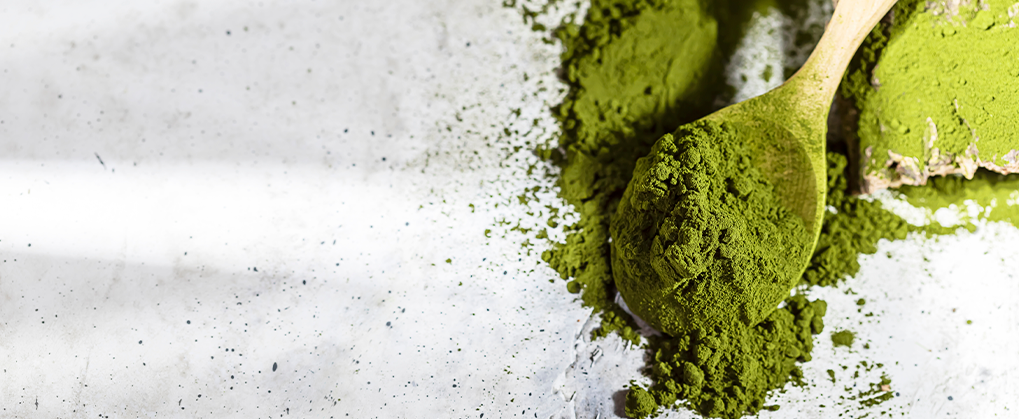EFFECTS OF SPIRULINA: THE SEAWEED SUPERFOOD


The effect of spirulina is currently the subject of heated debate. As one of the oldest cyanobacteria in the world, it has been considered an indispensable food and remedy in many parts of the world for thousands of years and has been appreciated worldwide as the latest superfood for some years now. On the other hand, however, some studies cast doubt on the highly praised effects of spirulina. So we ask, what is spirulina good for, does the spirulina powder effect differ from spirulina tablets and does the dietary supplement deliver what it promises?
A look at the ingredients and Spirulina's nutritional values provides the first clues. The alga grows mainly in fresh water rich in minerals, but can also be found in salt water. It is considered a high-protein food (the proportion is about 60%) and is rich in B vitamins, amino acids and trace elements.
Spirulina ingredients and nutritional values:
> Iron
> Selenium
> Magnesium
> Potassium
> Beta-carotene
> Calcium
> Linolenic acid
> Tyrosine
> Vitamin E
> Pigments: phycocyanin and chlorophyll
> Phosphorus
Based on these ingredients and the use of spirulina, among other things in traditional medicine, the following possible effects of spirulina result:
> strengthens the immune system
> gives energy
> inhibits inflammation
> has an antioxidant effect
> has an antiviral effect
> supports cardiovascular health
> can contribute to weight loss
> can help compensate for nutrient deficiencies
The effects of Spirulina tablets, powder or capsules do not differ (when used correctly). The only important thing is that the respective products are of high quality: pure, tested and ideally obtained in an aquaculture (to exclude pollutants or toxins).
The algae is popular because it is a natural product and spirulina side effects are very rare. However, to enjoy the best possible benefits from spirulina, proper use is essential. Read more in the blog: Dosage of Spirulina.
Spirulina areas of application: What is spirulina good for?
The areas of application are very extensive and range from normal food supplements to dietary support to the use of spirulina as cosmetics. However, not all of the mentioned effects of the microalgae can be based on scientifically proven studies beyond doubt, as many are based on a few laboratory or animal experiments. Nevertheless, we would like to take a closer look at some of the potential effects of spirulina algae.
Spirulina in the cosmetics industry
The cyanobacterium contains a lot of phycocyanin, which also gives it its striking green-blue colouring.
Antioxidants, vitamins and nutrients (including selenium, vitamin E and tyrosine) also have an antioxidant effect. They thus protect the body's cells from free radicals, which are responsible for the ageing process and certain diseases, among other things.
This is not only exploited by the food industry to colour certain products with the alga, but also by the cosmetic industry with spirulina anti-aging products. Many users swear by the protective Spirulina effect for skin and hair. Besides creams, face masks and other beauty products with spirulina are popular to slow down the ageing process of the skin.
Beauty masks are said to create soft skin and a fresh complexion, and tired eye areas are said to benefit from spirulina's firming effect on the skin. The effect of spirulina for hair is described as: more strength, shine, less dryness, simply healthy hair. In addition, taking spirulina is said to counteract hair loss.
Effect of spirulina on weight loss
The microalgae is often used to support dieting. On the one hand, it stimulates the metabolism, on the other hand, it contains protein and important nutrients that are supposed to curb the appetite for large meals but at the same time supply the body with important nutrients.
Spirulina effect on intestinal health
Spirulina's effect on the intestines has been known mainly in the field of alternative medicine. A rather unpleasant side effect at the beginning of the intake can be the increased gas formation in the intestine, because metabolism and gastrointestinal movements are stimulated. Spirulina is also said to contribute to a healthy intestinal flora. Pathogens are broken down and transported out of the body. This effect of the Spirulina algae is also said to support the body in detoxification. A popular basis for diets.
Spirulina effect on heart, circulation, cholesterol, and more
According to some studies, taking the microalgae also helps to prevent cardiovascular diseases: among other things, it regulates blood pressure, lowers cholesterol, strengthens the immune system and prevents nutrient deficiencies. Spirulina is also very popular for iron and vitamin deficiencies (leading to sleep problems, fatigue, listlessness, etc.)
Due to the many health-promoting nutrients, the Spirulina effect can also be supportive in some cases of thyroid diseases. But: pre-existing conditions and deficiency symptoms are always complex and individual. The use of spirulina should therefore always be discussed with a medical specialist, also in order to exclude side effects or interactions.
Read more about spirulina side effects here.
Spirulina as a food supplement
As a food supplement, spirulina is considered a superfood. Due to their high nutrient content, cyanobacteria and algae have been valued as an important food in many countries (including Australia and Central America) for centuries.
The microalgae are also available in Europe: you can buy them as spirulina capsules or spriulina powder, which you can add to mueslis or drinks. The algae can also help to compensate for a certain nutrient deficiency in vegan and vegetarian diets and is valued for its health-promoting effect.
Sources:
https://herbano.com/de/ratgeber/spirulina
https://de.wikipedia.org/wiki/Spirulina
https://medizin-transparent.at/spirulina-wirkung/
https://www.freundin.de/kochen-spirulina-gesund
Text author:
Kay Svegler
Communications, PR, American Studies, University of Leipzig
Journalist and freelance writer (e.g. Süddeutsche Zeitung, BILD, MDR etc.)
Former Senior PR Manager for Fischer Appelt, Sustainability and Diversity Manager for DKB





_front%20(1)-250x250.png)



_front%20(1)-250x250.png)

-(NN)_front%20(1)-min-250x250.png)

_front%20(1)-250x250.png)


_front%20(1)-min-250x250.png)
_front%20(1)%20(1)-250x250.png)

_front%20(1)%20(1)-250x250.png)
_front%20(1)-250x250.png)
_front%20(1)-min-250x250.png)




